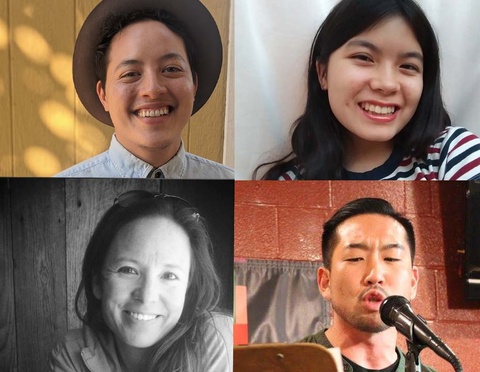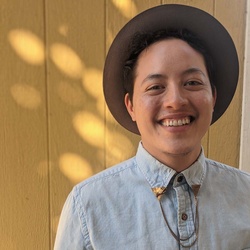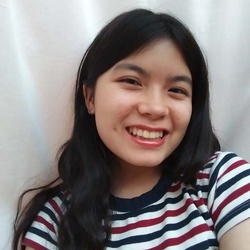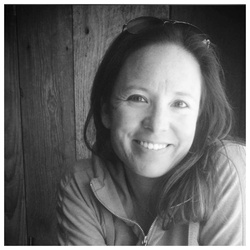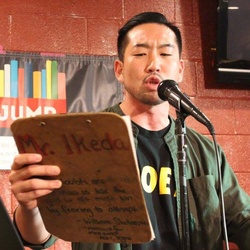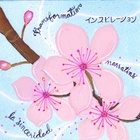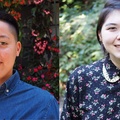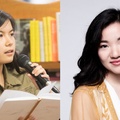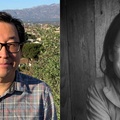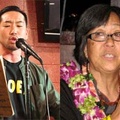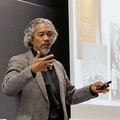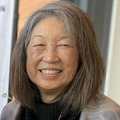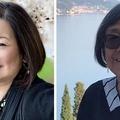Upon this 80th anniversary since the signing of E.O. 9066 during WWII that led to the family separation, house arrest, coerced and forced removal, imprisonment, and mass incarceration of Nikkei throughout North America and especially on the West Coast of the U.S., I wanted to reach out to several writers we have featured in past editions of Nikkei Uncovered, to see if they'd like to share a piece related to this month of commemoration and countless Day Of Remembrance programs happening throughout the country.
I'm honored and happy to share here, four magnificent writers—from youth to yelder (young elders), from L.A. to Oakland to Idaho—truly beautiful, from-the-heart and soul pieces: bilingual and multi-layered storytelling from Rey Fukuda Salinas; from the tongue of power by Greer Nakadegawa-Lee; a piece written five years ago for the 75th Anniversary of E.O. 9066 that speaks loudly today by Noriko Nakada; and a piece held up for us all from Kurt Yokoyama-Ikeda, followed by a template he created for you to continue with your own verse...please enjoy.
—traci kato-kiriyama
* * * * *
Rey Fukuda Salinas (he/they) is Japanese-Paraguayan currently living in Los Angeles (Kizh land). He grew up internationally in places like Japan, the Dominican Republic, and Guatemala. Fortunate to have discovered writing music and poetry to express emotions as a mixed race transgender queer young person, art kept Rey going during times of being closeted and growing up in an emotionally unstable home. Rey is self taught in guitar and a song writer inspired by many artists including Frank Ocean, Yo-Yo Ma, Nina Simone, and Pablo Neruda. He writes songs and poetry about long distance & chosen family, love, (im)migration, prisons, freedom but also just random realizations.
Spirit elder
I tend to my garden
to remind me of you.
Smoking a pipe
The cherry oak smoke
Snaking through succulents and paint.
Wait, wait!
You took another good look at my face
Studying what was changing
The hair texture, the jawline
Nodding, OK.
Going back to your painting.
I tend to my garden
to remind me of you.
Telling us another story
of how art saved you, saved us.
I keep coming outside
Greeting the fading sun.
Stay, stay!
Maybe you’ll see more and take another good look
The hairline, the flatter chest
And draw it in the clouds.
Me cuentas (storyteller)
Eres buena lengua (you are good tongue)
Te explico ahora como fue (I’ll explain to you how it was)
Hace tiempo (many years ago)
Construyendo armas (building weapons)
Para protegernos (to protect us)
De los hombres malos (from the bad men)
Eres viaje largo (you are a long journey)
De un avión sin copiloto (of an airplane with no co-pilot)
De nubes esponjosos (of sponge-like clouds)
Regalando mi sueño (giving away sleep)
The sky is like my crying
So heavy, clouds cayendo (collapsing)
The damp is like my sweating
So warm and adjoining
Now, all
blended together
Blue pink and white feather
Tiny little sad
Remembering the flag
Every day is remembrance
Of people who are and were
Decorate my face
As a twelve year old girl
Y si pierdo mi pelo (and if I lose my hair)
Me decoro con lapiz del suelo (I’ll fill it in with a soft lead pencil)
Y si pierdo mi fuerza (and if I lose my strength)
Lo esculpo de hielo (I’ll sculpt it out of ice)
*These poems are copyrighted by Rey Fukuda Salinas (2022)
* * * * *
Greer Nakadegawa-Lee is 17 years old and a senior at Oakland Technical High School. She has written a poem every day for over three years now, and she was the 2020 Oakland Youth Poet Laureate. Her first chapbook , A Heart Full of Hallways is out now with Nomadic Press.
Plaything
If I kick you out of the stores.
If I spit on your name.
If I leave graffiti on your walls.
If I dismantle your face into propaganda,
If I force you to pack your life into garbage bags,
as if to show you just how much I value it,
will you bear it?
Will you still let me call you my children afterwards?
If I suffocate you in wire will you still fight my wars for me?
If I treat you like animals will you try to make your hands more human,
make crafts with them,
play baseball,
try to convince one another that things could be worse.
Does it bother you
that when I teach your grandchildren what I did to you,
I will use my calmest tone of voice.
I will emphasize the sound of running water,
of chuckling through the thin walls,
I will talk about what a stoic prisoner you were.
If I wind you up now,
do you still smile?
Do you still march around the room,
If I pick you up now do you still hang your arms limp-
Will you let me put your body on the operating table,
let me keep the parts of you I want to play with?
*This poem is copyrighted by Greer Nakadegawa-Lee (2022)
* * * * *
Noriko Nakada is a multi-racial Asian American who creates fiction, nonfiction, poetry, and art to capture the hidden stories she has been told not to talk about. She advocates for young people, teachers, women and non-binary writers to create a more just and equitable world. She is the author of the Through Eyes Like Mine memoir series. Excerpts, essays, and poetry have been published in Hippocampus, Catapult, Linden Ave, and elsewhere. She serves on the leadership team and as blog manager for Women Who Submit: empowering women and nonbinary writers to submit their work for publication.
Marbles
on the 75th Anniversary of Executive Order 9066
Eleven years old and told
“take only what you can carry”
you hide six glass marbles, smooth and cold
in your jacket pocket:
a shooter, cats eye, two aggies,
two comets, swirls of yellow and blue
click inside sweaty palm
while in line for breakfast, lunch, and dinner.
Six marbles hope for a game
in summer dust
but six aren’t enough
and you fear losing more.
Late one night
you lay marbles on the straw mattress
in the room you share
with Ma, Pop, and four siblings.
Flick the shooter hard against the others;
send two marbles rolling across rough wood floorboards
to where they find a crack
and fall
lost forever
like the brothers who never make it back.
Four marbles left
to keep safe
for the train ride to Heart Mountain
but the train jostles
and three roll beneath
bench seats; disappearing.
Say what they all say. Shikata ga nai.
It cannot be helped.
Step into a desert of more Japanese faces
than you’ve ever seen
with only one marble in your palm.
Try to remember who you are;
gaze up at the night sky
an expanse of more stars than you’ve ever seen
and wonder if you will ever
find your way back
to the boy you were before.
* This poem is copyrighted by Noriko Nakada and originally published in The Rising Phoenix Review (2018).
* * * * *
Kurt Yokoyama-Ikeda (he/him) is Shin-Nisei educator by profession, poet by passion. Raised in the South Bay of Los Angeles, he lives in Idaho with his beloved wife April. Kurt preserves the legacy of the WWII incarceration of Japanese Americans as the Director of Interpretation and Education at Minidoka National Historic Site (Jerome, ID).
“I Carry”
Inspired by “Where I’m From” by George Ella Lyon & “I Am From” by Levi Romero
Where are you from?
Torrance, CA
No, really where are you from?
I am from the Pacific sea breeze.
The peach tree with busy bees
“Whose long gone limbs I remember
As if they were my own”.
Only a butterfly crest necklace
What daddy, left for me, remembers that.
You
Can
Carry
“Home”.
I carry my pens and papers, pencils and erasers,
From the house with a gunshot wound below my mother's window sill.
I carry umeboshi plums, miso (fermented beans), and lactaid pills,
and hot summer day bicycle rides to Rite-aid also.
I carry Nam-Myo-Ho-Renge-Kyo on Sundays.
I carry “Tadaima-I’m home” and “Okaeri-Welcome home”.
Only my parent’s parents and their parents
Who are now memories, knows that
You can carry a tune in two tongues
Where I’m from.
I carry Honolulu and Sakata, Gardena and Minidoka.
I carry my fiancée.
And the 22nd of August, 2020, too.
I carry Miyake and Okushiba, Yokoyama, and Ikeda.
I carry cities made of Crystals and mountains made of Hearts.
I pilgrimage to you.
From Obaachan riding her tricycle to dialysis
To mama and her sister by her side when she died.
I carry, “it can’t be helped - shikata ga nai”
Only what you can’t hear is the chime of grandma's rice cooker when the cooking is done.
I carry this in my heart.
So when you ask me, where I am from.
Know that I carry fermented love.
Now, where are you from?
《Create your own "I Carry" Poem》
Inspired by “Where I’m From” by George Ella Lyon & “Where I’m From, De Donde yo soy” by Levi Romero.
DIRECTION: Ponder the following prompts, consider “only what you carry,” and create poetry to heal.
Where are you from?
(A place where you call home)
No, really where are you from?
I am from (the weather around where you live)
The (plant or tree near your home)
“Whose long gone limbs I remember
As if they were my own”.
Only (object passed down from a family member)
What (family members), left for me, remembers that.
You
Can
Carry
I carry (an everyday item in your home) and (everyday item in your home)
From the (description of your home)
I carry (family food), (family food), and (kitchen utensils or condiments)
and (a holiday, a season, or a celebration) also.
I carry (a song, song lyric, or a dance) on (day of the week or season)
I carry (something you were told as a child) and (another thing you were told as a child)
Only (someone you have lost) and (someone else you have lost)
Who are now memories, knows that
You can carry (your choice)
Where I’m from.
I carry (place of birth) and (other places you call home)
I carry (important people in your life)
And (an important date) too.
I carry (family names)
I carry (places that are important to your family)
I pilgrimage to you.
From (write about a family member who has passed)
To (write about a family member who is living)
I carry (the emotion you feel about these people)
Only what you can’t (see/feel/hear) is (something your family left behind or lost)
I carry this in my heart
So when you ask me, where I am from.
Know that I carry (your choice)
Now, where are you from?
*The above poem and its template are copyrighted by Kurt Yokoyama-Ikeda (2022)
© 2022 Rey Fukuda Salinas, Greer Nakadegawa-Lee, Kurt Yokoyama-Ikeda; 2018 Noriko Nakada






